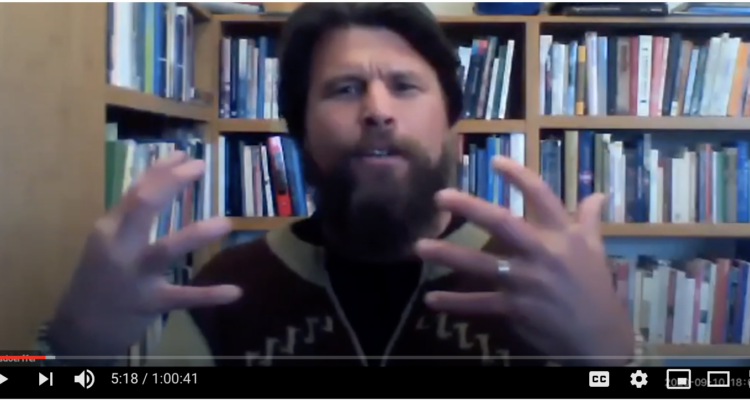On Thursday, Sept. 10, Dr. John Hausdoerffer gave the Vail Symposium audience a preview of the key concepts in his forthcoming book, “What Kind of Ancestor Do You Want To Be?” Before doing so, he posed that question to the audience. The question is significant because it forces respondents to think larger and longer scale.
- He shared a personal story of snow hunting with his two young daughters. They have challenged themselves to ski 100 months in a row. If they can complete this challenge their father has agreed to take them to the ski area of their choosing anyone in the world. On a recent search for snow, they hiked miles to Yule Pass, in the past a reliable location of snow in September, only to find that most of the snow was gone. Dr. Hausdoerffer described his daughter Sol’s expression–not just disappointment, but grief. He told this impactful, personal story because as he acknowledged, stories have more impact than data.
- Dr. Hausdoerffer organized his talk around several key concepts, the first of which was “The Land.” More than soil, the concept of the land encompasses the entire ecosphere we inhabit. Because he is also a philosopher, philosophical concepts were imbued throughout his remarks. He speculated that our moral capacity has not expanded at the same pace as technological advancements. Furthermore, he also speculated that humans have not evolved to have a moral capacity to match our global distribution. Therefore, he suggested people think of themselves as “placelings” versus “Earthling.” A placeling adapts to the reality of a place and becomes of the place, rather than attempt to dominate the place. He acknowledged that this philosophy can be found in many indigenous cultures but may be foreign to those with a colonial mindset which is more nomadic and more likely to move elsewhere if resources in one place are used up.
- Dr. Hausdoerffer’s last concept was inspired by a visit to the White Earth Reservation in Minnesota. It was there that he met Micahel Dahl, who spoke with reverence for the wild rice that grew there and fed his family and community. This rice was Dahl’s barometer of the health of the community. Once again, Dr. Hausdoerffer asked the audience, “What is your rice?” In other words: What measurement informs you that your community is healthy and resilient? Audience answers ranged from the personal such as parenting to environmental, social and cultural.
- Check out this film: Devon Pena, “Wildness”


